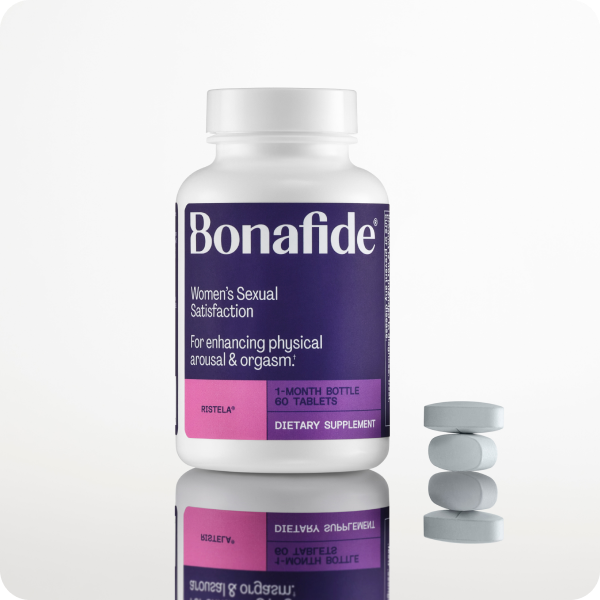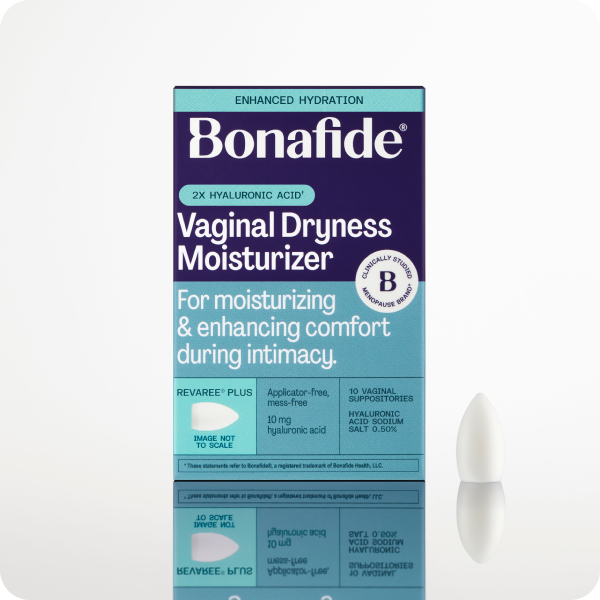Are you looking to explore best ways to increase sexual desire during menopause? Below includes our comprehensive guide on how to increase sexual desire and satisfaction during this transitional period and beyond.
During menopause, women may experience a decrease in sexual desire, while some may actually experience the opposite, with an increase in libido during perimenopause.1 While a decrease in interest or desire to have sex is not an uncommon concern, it’s important to know that there are multiple ways to address it.
Whether the cause is hormonal, physiologic, psychological, or emotional, the key is understanding what’s happening in your body and mind, and then taking proactive steps to reignite the spark. If you're wondering how to improve your sexual desire during menopause, there are practical approaches you can take to address the lack of sex drive and satisfaction you may be experiencing at this stage. Let’s dive in.
Address Hormonal Changes: Specifically Estrogen and Testosterone
Hormonal fluctuations, particularly the decline in estrogen levels, play a significant role in decreasing sexual desire during menopause. Estrogen works to influence vaginal lubrication and overall sexual comfort; therefore a decrease in estrogen can lead to vaginal dryness, discomfort during sex, and reduced libido – after all, who can think about engaging in sexual activity if they’re actively in pain or uncomfortable?! Testosterone, which plays a role in sexual desire, also declines during this transitional time and due to age.2
Tip #1: Hormone Replacement Therapy (HRT)
A woman experiencing menopause symptoms like hot flashes, vaginal dryness and pain during sex might decide to consult with her healthcare provider about systemic hormone replacement therapy (HRT) also known as menopause therapy (MT) or local, vaginal hormone treatment options to address her symptoms.
Systemic hormonal therapy can be delivered through pills, patches, creams, or vaginal rings. Local vaginal estrogen creams, tablets or rings, in particular, can be helpful for restoring moisture to the vaginal area, in addition to reducing discomfort – making sex more enjoyable and less painful.3
Tip #2: Testosterone Therapy
If a woman has tried estrogen-based therapies but still notices a definitive lack of sexual desire, a healthcare provider might recommend exploring low-dose testosterone therapy. Testosterone is often available in the form of topical creams or patches, and it can help boost sexual desire and drive, especially in women who notice a significant decrease in libido.4 Testosterone is not approved by the FDA to address low sexual desire in women, however, both the Endocrine Society and the International Society of Women’s Sexual Health (ISSWSH) do support the use of testosterone for hypoactive sexual desire disorder.5
Know the Psychological Factors: Addressing Stress, Anxiety, and Body Image
Psychological factors, such as stress, anxiety, depression, or body image issues, may significantly impact sexual desire. During menopause, women can experience heightened levels of stress due to life changes, such as aging, career pressures, children leaving home, or financial concerns.6 These emotional factors can have a negative impact on sexual desire and make it harder to feel excited about sex.
Tip #3: Practice Mindfulness and Relaxation
To help reduce anxiety and stress, women can consider practicing mindfulness or meditation. One effective approach is deep breathing exercises, where you inhale deeply for a count of four, hold for four seconds, and exhale for four seconds. Doing this for 10-15 minutes a day could help to reduce stress, improve mental clarity, and enhance the ability to relax during intimate moments.7
Tip #4: Engage in Regular Exercise
Regular exercise, particularly cardiovascular activities like walking, jogging, or cycling, can help release endorphins, which are the body’s natural stress reliever. One study found that just 20 minutes of brisk walking three times a week significantly improved sexual function in women – this exercise not only can help to improve mood, but it can also increase blood flow to the genitals, potentially increasing sexual desire.8
Tip #5: Reconnect with Your Body
A woman who feels disconnected from her body due to menopause might consider activities like yoga or Pilates to help improve body image and boost self-esteem. Specific yoga poses, such as Child's Pose or Cobra Pose, for example, may help increase circulation to the pelvic region and relax the body, which may enhance sexual pleasure and comfort.9
Tip #6: Value Yourself and Articulate Your Desires
It’s not unusual for women to be conditioned by societal and cultural norms to put others’ needs before their own, often slipping into the “people-pleaser” role. This can easily spill over into sexual relationships, where women may feel hesitant to ask for what they truly want.
If your experience of pleasure has changed during menopause, it’s possibly time to explore rediscovering your body. Consider taking the time to experiment and relearn what feels good for you. Women are complex, multifaceted beings, and so are their partners. As women age and evolve, desires change. What worked in your 20s may not work now—and that’s okay.
Romantic relationships evolve, too.
If you're considering exploring new relationships, self-reflection is key to understanding what you want to give and receive. Pleasing yourself is a powerful gift you bring to any intimate encounter. The more you know about what works for you, the better you can communicate that with your partner.
Tip #7: Learn Your Love Language
We all express love and passion differently and understanding your unique love language can help to deepen your relationships. Maybe you thrive on physical touch, or perhaps acts of service make you feel most appreciated. If you’ve been in a long-term relationship, you might think you know each other’s preferences well—but there's always more to discover.
Consider taking this time to reassess your own needs and desires. Intimacy goes beyond just physical connection—it’s psychological too. And sex isn’t always about penetrative intercourse; sometimes, it’s about finding new ways to connect and feel seen by your partner.
You can explore the five know love languages a bit more deeply, and even consider taking a quiz to better understand how you both prefer to give and receive love.10 This can be a helpful tool in reshaping your connection and ensuring you're meeting each other's evolving emotional and physical needs.
Tip #8: Reflect and Journal to Reconnect with Your Sensuality
Taking time to reflect on what makes you feel connected to your partner and sensual can be incredibly powerful. If you're open to it, starting a sex journal can offer you a safe space to explore your desires, fantasies, and experiences.11 It’s not just about tracking your physical experiences—it’s about better understanding your personal journey of what brings you pleasure as your needs evolve.
While a sex journal can help facilitate communication with a partner, its main focus should be on you. This tool is about reclaiming your sensuality and learning more about what excites and fulfills you, free from external expectations. Whether you're looking for ways to boost sexual desire or simply want to get your sexual desire back, journaling can offer valuable insights into what might reignite your passion and help you explore your evolving needs.
Relationship Factors: Communication and Emotional Intimacy
Often, a decrease in sexual desire during menopause can stem from emotional disconnection in a relationship. Women might find themselves less attracted to their partner, or they may feel that intimacy has been overshadowed by the stress of daily life. It’s important to know that there are things you can do to address relationship pain points that may be impacting your sexual desire during menopause, as well.
Tip #9: Communicate with Your Partner
A woman could begin by talking to her partner openly about her feelings and causes of low sexual desire. For instance, a conversation starter may be, “I’ve noticed that I’ve been feeling less interested in sex lately, and I’d like to explore how we can reconnect intimately.” This dialogue can help to foster emotional intimacy, which often helps rekindle physical desire.
Tip #10: Create Romantic Experiences Together
Couples can take steps to enhance their emotional connection by engaging in non-sexual intimacy, too. Planning regular date nights, such as cooking dinner together, attending a concert, or simply watching a movie and holding hands, can help reignite the spark. A romantic gesture like writing a love letter or planning a weekend getaway may also help to strengthen emotional closeness, which in turn, can lead to an improved sexual connection.
Lifestyle Changes: Healthy Habits for Better Libido
Making certain lifestyle changes can support overall sexual health and boost sexual desire during menopause. This can include adjusting certain daily habits to reduce stress, improve sleep, and nourish your body.
Tip #11: Prioritize Sleep Hygiene
A lack of sleep can cause irritability and fatigue, both of which negatively affect libido.12 To improve sleep, a woman can try setting a regular sleep schedule, avoiding caffeine late in the day, or creating a calming bedtime routine. For example, drinking a cup of herbal tea, like chamomile, or using lavender-scented oils in the bedroom, can help to promote relaxation and improve sleep quality.
Tip #12: Healthy Eating for Hormonal Balance
To support sexual health, a woman could focus on eating foods that support hormone health. Foods rich in healthy fats, such as avocado, olive oil, and nuts, can help maintain healthy hormone levels – which means omega-3 fatty acids found in certain fatty fish, macadamia nuts or peanuts and almonds may support mood regulation and sexual function.13
Tip #13: Consider Dietary Supplements for Arousal
Certain herbal supplements, specifically those containing nutrients like L-arginine, maca root or ginseng combined with Vitamin E, might potentially help arousal, however, more research is needed to determine how effective they are.14 As always, it’s essential to talk to a healthcare provider before trying any new dietary supplements to ensure they’re safe, clinically validated and effective for your specific needs.
Exploring New Sexual Experiences: Finding What Works for You
Sexual experiences during menopause may require some experimentation. Many women find that their bodies respond differently to stimulation, and they may need to discover new ways to achieve pleasure.
Tip #14: Explore Clitoral Stimulation Devices or Personal Massagers
As women age, they may notice that achieving orgasm takes more time or requires different types or combinations of stimulation. Investing in a high-quality, clitoral personal massager device, such as a vibrator, can offer a more direct form of stimulation, increasing sensitivity, boosting blood flow and helping reach orgasm more effectively.15
Tip #15: Use Lubricants or Vaginal Moisturizers
A woman experiencing vaginal dryness might find that adding a lubricant or vaginal moisturizer can make sex more pleasurable and reduce discomfort during intercourse; encouraging a more enjoyable sexual experience.
Embracing Your Sexual Health During Menopause: Key Steps to Rekindle Desire
While menopause brings about many changes, it doesn’t have to mean the end of a fulfilling sex life. By addressing changes in hormones, mental health, partnership communication, and physical well-being, women can take control of their sexual health and find ways to boost their libido and increase sexual desire during menopause and beyond. The most important step is identifying the underlying causes of low sexual desire and then taking action with the support of healthcare providers, partners, and self-care techniques.
By embracing one or more of these strategies, you can hopefully find ways to rekindle the sexual desire you deserve during this stage of life. Remember, there is no one-size-fits-all solution, so be patient and persistent in exploring how to get your sexual desire back.
For more tips and advice regarding sexual health and desire during menopause, watch this quick video from Bonafide Chief Medical Officer, Dr. Alyssa Dweck, below:
Resources
- https://www.healthline.com/health/menopause/menopause-libido
- https://www.medicalnewstoday.com/articles/320266
- https://www.mayoclinic.org/diseases-conditions/low-sex-drive-in-women/diagnosis-treatment/drc-20374561
- https://www.healthline.com/health/menopause/sex-after-menopause#treatment-options
- https://www.endocrine.org/news-and-advocacy/news-room/2014/experts-recommend-against-diagnosing-testosterone-deficiency-in-women
- https://www.medicalnewstoday.com/articles/320266#medical-options
- https://www.healthline.com/health/menopause/sex-after-menopause#mind-body-healing
- https://www.webmd.com/sex-relationships/features/sex-and-weight
- https://www.webmd.com/sex-relationships/ss/slideshow-better-sex-exercises
- https://www.mymenopausecentre.com/blog/revive-your-sex-drive/
- https://www.self.com/story/sex-journal
- https://www.sleepfoundation.org/physical-health/sex-sleep
- https://www.healthline.com/nutrition/balance-hormones#healthy-fats
- https://www.verywellhealth.com/natural-remedies-for-sexual-dysfunction-in-women-89935
- https://pmc.ncbi.nlm.nih.gov/articles/PMC11150285/










